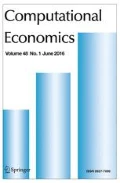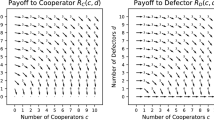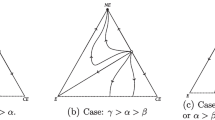Abstract
In evolutionary psychology, cultural phenomena are explained with reference to evolved psychological processes. This paper presents an economic approach to explore this link by demonstrating how social stratification can arise in game-playing populations as a result of social categorisation of and inference from arbitrary agent traits. The computer simulation of the model demonstrates that agents' increasing ability to categorise opponents in the chicken game generates an increasing number of social groups whose members share commonality of fate both in terms of opponent behaviour and payoff levels.
Similar content being viewed by others
References
Ashraf, N., Bohnet, I. and Piankov, N. (2003). Is trust a bad investment? working paper, Harvard University.
Aumann, R.J. (1987). Game theory. In: J. Eatwell, M. Milgate and P. Newman (eds.), The New Palgrave: A Dictionary of Economics, MacMillan, London, pp. 1–53.
Axtell, R., Epstein, E. and Young, H.P. (1999). The emergence of economic classes in an agent-based bargaining model. In: S. Durlauf and H.P. Young (eds.), Social Dynamics, Oxford University Press/Santa Fe Institute.
Barkow, J.H. (1992). Beneath new culture is old psychology: Gossip and social stratification. In: J.H. Barkow, L. Cosmides and J. Tooby (eds.), The Adapted Mind: Evolutionary Psychology and the Generation of Culture, pp. 627–637.
Becker, G.S. (1957). The Economics of Discrimination, University of Chicago Press, second edition.
Berger, U. (2005). Fictitious play in 2times n, games. Journal of Economic Theory, 120, 139–154.
Brown, G.W. (1951). Iterative solution of games by fictitious play. In: T. C. Koopmans (ed.), Activity Analysis of Production and Allocation, Wiley, New York, NY, pp. 374–376.
Brown, R. (2000). Group Processes, Blackwell, Oxford, second edition.
Burns, J. (2004a). Inequality aversion and group identity in a segmented society. Working Paper.
Burns, J. (2004b). Trust and reciprocity in post-apartheid South Africa. Working Paper.
Camerer, C.F., Loewenstein, G. and Prelec, D. (2005). Neuroeconomics: Why economics needs brains. Scandinavian Journal of Economics 106(3), 555–579.
Chase, I.D. (1980) Social process and hierarchy formation in small goups: A comparative perspective. American Sociological Review 45(6), 905–924.
Chase, I.D., Bartolomeo, C. and Dugatkin, L.A. (1994). Aggressive interactions and inter-contest interval: How long do winners keep winning? Animal Behavior 48, 393–400.
Chuah, S.H., Hoffmann, R., Jones, M.K. and Williams, G.A. (2004). Do cultures clash? Evidence from cross-national ultimatum game experiments. Forthcoming in: Journal of Economic Behavior and Organization.
Fershtman, C. and Gneezy, U. (2001). Discrimination in a segmented society: An experimental approach. The Quarterly Journal of Economics 116(1), 351–377.
Fiske, S.T. and Taylor, S.E. (1991). Social cognition, McGraw-Hill, second edition.
Gintis, H. (forthcoming), Unifying the behavioral sciences. Behavioral and Brain Sciences.
Kurzbahn, R., Tooby, J. and Cosmides, L. (2001). Can race be erased? Coalitional computation and social categorization. Proceedings of the National Academy of Sciences 98(26), 15387–15392.
Lambert, A.J. and Chasteen, A.L. (1999). Social cognition. In: W. Bechtel and G. Graham (eds.), A Companion to Cognitive Science, Blackwell, Oxford, Vol. 14 of Blackwell Companions to Philosophy, pp. 306–313.
Mailath, G.J. (1992). Introduction: Symposium on evolutionary game theory. Journal of Economic Theory 57, 259–277.
McElreath, R., Boyd, R. and Richerson, P.J. (2003). Shared norms and the evolution of ethnic markers. Current Anthropology 44(1), 122–129, mimeo.
Mesterton-Gibbons, M. (1999). On the evolution of pure winner and loser effects: A game-theoretic model. Bulletin of Mathematical Biology 61, 1151–1186.
Milgrom, P. and Roberts, J. (1991). Adaptive and sophisticated learning in normal form games. Games and Economic Behavior 3, 82–100.
Mueller, D.C. (2003). Public Choice III, Cambridge University Press, Cambridge, UK.
Nettle, D. and Dunbar, R.I.M. (1997). Social markers and the evolution of reciprocal exchange. Current Anthropology 80(1), 93–99.
Oakes, P.J., Haslam, S.A. and Turner, J.C. (1994). Stereotyping and Social Reality, Blackwell, Oxford.
Orbell, J., Zeng, L. and Mulford, M. (1997). Individual experience and the fragmentation of societies. American Sociological Review 61(6), 1018–1032.
Simon, H.A. (1981). The Sciences of the Artificial, MIT Press, Cambridge, MA.
Tooby, J. and Cosmides, L. (1992). The psychological foundations of culture. In: J.H. Barkow, L. Cosmides and J. Tooby (eds.), The Adapted Mind: Evolutionary Psychology and the Generation of Culture, pp. 19–137.
Author information
Authors and Affiliations
Corresponding author
Additional information
JEL classification: C72, D83, J70
Rights and permissions
About this article
Cite this article
Hoffmann, R. The Cognitive Origins of Social Stratification. Comput Econ 28, 233–249 (2006). https://doi.org/10.1007/s10614-006-9046-2
Received:
Accepted:
Published:
Issue Date:
DOI: https://doi.org/10.1007/s10614-006-9046-2




